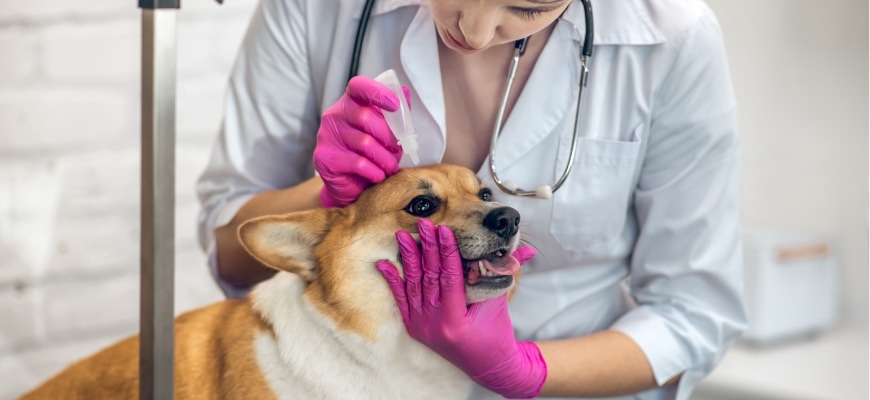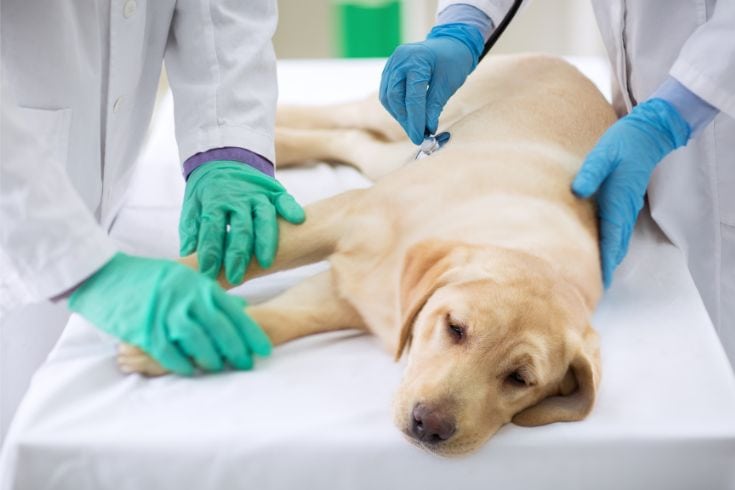If you’re a newbie pet parent, you might have heard of colloidal silver for dogs and wonder why you would give it to your canine companion.
So, what is colloidal silver for dogs? How much is the correct nano silver dosage? And does giving your dog colloidal silver have any bad side effects?
Read this guide to learn more about colloidal silver supplements and why you might want to use them for your furry friend.
What Is Colloidal Silver For Dogs?

Colloidal silver has been a human health supplement for thousands of years. In fact, the Greeks and Romans used it as early as 400 BC as a natural antifungal, antiviral, and antibacterial agent.
The colloidal silver solution is a liquid suspension containing microscopic nanoparticles of the highest quality silver that are invisible to the naked human eye in a pure water suspension without additives. Despite its name, colloidal silver is usually yellow or golden in color.
What Can Colloidal Silver Supplements Do For Your Dog?
Silver is used for its antibacterial and sterilization properties, and you’ll find it in products such as personal hygiene products, bandages, wound dressings, and even cosmetics.
When used for dogs, colloidal silver is said to:
- Combat fungal and yeast infections, such as ringworm
- Kill bacteria and fight bacterial infections
- Soothe skin infections, inflamed skin, dryness, and itching
- Aid in healing:
- Infections and burns
- Eye infections
- Breathing problems, including asthma, pneumonia, and bronchitis
- Ear infections
- Canine distemper
In human medicine, proponents of colloidal silver maintain that the substance has antiviral properties and can help control some viruses, including Hepatitis C and HIV, kill certain types of cancer, and provide support to the body’s immune system.
Does Colloidal Silver Work?

Although it’s not entirely clear exactly how colloidal silver works so effectively and so quickly against such a broad range of health issues, the treatment has many advocates.
It’s thought that the microscopic particles of silver in the nano-silver solution can penetrate individual molecules and kill many kinds of pathogens, including bacteria, viruses, parasites, and fungi.
Can You Put Colloidal Silver In Your Dog’s Drinking Water?
There are many ways to administer colloidal silver to your dog. Generally, the substance is given orally in your dog’s drinking water, topically in cream form, or misted for inhalation through a nebulizer.
One huge plus point is that colloidal silver is almost odorless, tasteless, and doesn’t hurt when administered directly to the skin, ears, or eyes. Basically, you can put colloidal silver in your dog’s food or water, or directly into their mouth, depending on the condition you’re treating.
So, if you’re treating respiratory issues, you would use a mist or spray, while skin conditions are usually treated with a topical ointment.
My dog Jess suffered from a recurring skin condition on her paws that was originally caused by mites. Once the mites had been successfully despatched, I used a complementary topical treatment containing colloidal silver to promote healing and reduce skin inflammation.
Drug-Free Treatment

One of the big plus points about using colloidal silver for your dog is that it takes manmade drugs out of the equation. The supplement is often used to provide support for regular medical treatments, providing a holistic approach that gives your pup the best of both worlds.
Always discuss the use of colloidal silver with your vet before giving it to your dog.
Colloidal silver doesn’t provide a quick fix for serious medical conditions. If you think your dog has a severe medical problem, you must seek veterinary advice and follow an approved, appropriate course of treatment under your vet’s supervision.
If you’re using colloidal silver to treat your dog and he’s not improving, always consult your vet.
Is Colloidal Silver Safe For My Dog?
Although colloidal silver has been in common use for centuries, no credible scientific evidence suggests its use is safe. In addition, the FDA doesn’t approve of using colloidal silver for pets, and it’s thought that excessive exposure to the substance can be dangerous.
Silver is regarded as a “transition metal,” which places it between heavy metals like mercury and lead and nutritional minerals, including zinc and iron. Concerns center around the fact that although silver isn’t toxic, overexposure to it can cause physical damage to your dog.
Gut Reaction
One risk of using colloidal silver is that it could damage or even eliminate good bacteria in your dog’s gut, potentially impacting your dog’s digestive health and causing diarrhea and other problems.
With that in mind, topical colloidal silver appears much safer for your pet than oral use. If you do decide to give your furry friend colloidal silver orally, be sure to give your pet a probiotic and prebiotic to ensure good gut health.
Immune System Damage

Killing your dog’s good gut bacteria also damages your pet’s immune system, making it more difficult for them to fight off all kinds of diseases.
As well as the risk of causing damage to your dog’s intestinal system, using colloidal silver also risks causing organ damage. Silver gradually accumulates in the brain, liver, kidneys, and other major organs and your dog’s tissues. That can cause side effects, including the following:
- Lethargy, general ill health
- Muscle weakness
- Weight loss
- Kidney failure
- Liver issues, including changes to liver enzymes
- Neurological damage, such as seizures and tremors
If you decide to use colloidal silver, ensure your dog has clean water available 24/7. That ensures your dog’s body can flush out silver toxins.
In addition, colloidal silver can interact with some prescription drugs, including antibiotic medication and thyroid medicines, preventing the efficient absorption of medications.
Less commonly, excessive or prolonged use of colloidal silver can cause a permanent skin condition called argyria. Essentially, the accumulation of silver in the dog’s body can eventually turn the skin blue-gray.
To prevent overdosing and side effects, it’s generally recommended that you don’t use colloidal silver for over two weeks. Do not give colloidal silver to puppies; animal studies indicate it can cause dangerous side effects.
Colloidal Silver – Side Effects

Provided you use colloidal silver in the correct amounts and under veterinary supervision, your dog should not suffer any ill effects. However, if administered incorrectly or in excessive doses, the following side effects can result:
- Kidney problems
- Seizures
- Argyria
- Weight loss
- Hypoactivity
- Altered liver enzymes
- Altered blood values
- Enlarged heart
- Anorexia
- Weakness
- Anemia
If you notice any of these side effects or your dog develops any new symptoms, it’s essential that you speak to your vet immediately.
Final Thoughts
I hope you enjoyed our guide to colloidal silver for dogs. If you found the article helpful, please take a moment to share it.
People have used colloidal silver as an antifungal agent for centuries and as a holistic alternative for treating various health conditions. And recently, dog owners have begun giving colloidal silver to their pets as a supplement.
No medical evidence suggests that using a nano silver solution works, and it can cause side effects. So, always consult your vet before you begin using colloidal silver products to treat your dog.
Do you use colloidal silver? What do you use it for, and does it help your dog? Tell us in the comments box below.
